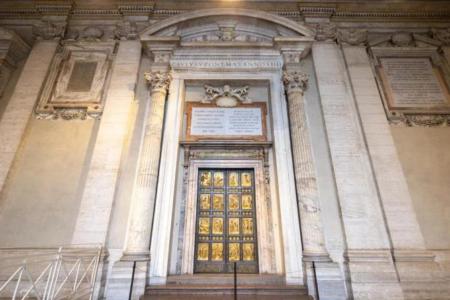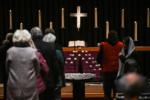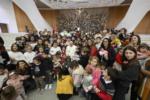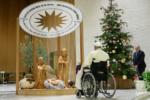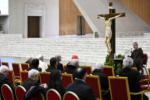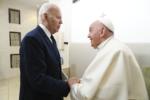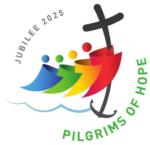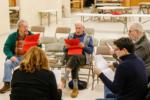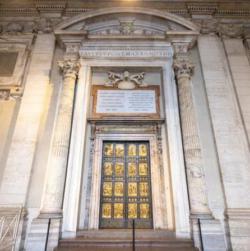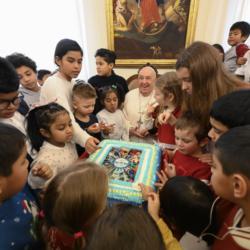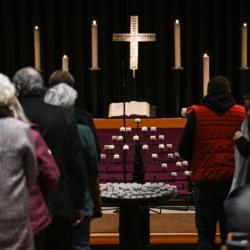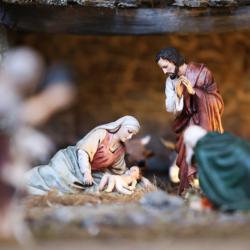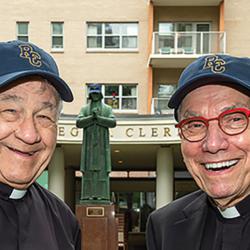Nuns on the Bus seek ways to close economic gaps for struggling families
CLEVELAND (CNS) -- Hungry children, low wages, poor urban schools, inadequate housing and a glaring lack of opportunity are some of the challenges facing struggling Clevelanders, agreed more than 100 people during a community caucus organized by a Catholic social justice organization.
But social and economic ills can be overturned by rearranging national priorities, participants said during a two-hour gathering hosted by St. Leo the Great Parish as part of the 13-state Nuns on the Bus tour assembled by Network, the Catholic social justice lobbying group.
The nine women religious on the bus pulled into Cleveland the afternoon of July 17, hours ahead of the start of the Republican National Convention. The fifth edition of Nuns on the Bus was to leave Cleveland July 19 and wind its way through the Northeast before ending July 26-29 in Philadelphia, site of the Democratic National Convention.
Since embarking July 11 from Madison, Wisconsin, Sister Simone Campbell, Network executive director and a member of the Sisters of Social Service, has facilitated similar discussions in Bloomington, Illinois; Jefferson City, Missouri; and Terre Haute and Fort Wayne, Indiana.
She said people's concerns were similar in each community and that participants offered an array of ideas to "Mend the Gaps" -- this year's tour theme -- to improve the lives of millions of low-income people.
"It's a story of heartbreak and racism, poverty, lack of transportation, lack of health care," Sister Simone told Catholic News Service afterward. "But the hope of people willing to come together to find another way has been energizing."
In Cleveland, participants offered numerous "visions" in addressing six policy areas: health care, citizenship, democracy, housing, family-friendly work policies and tax justice. Participants were invited to sign cards pledging support for their proposals. Network staff plan to take the cards to members of Congress from each respective state after they take office in January asking them to back the proposals.
One group imagined raising the minimum wage to $20 an hour. They agreed that such an increase was unlikely, but that any raise, indexed to the cost of living in a particular locale, would strengthen families. A boost in the minimum wage would be particularly helpful, participants agreed, especially in Cleveland, where 54 percent of children lived in poverty in 2014, according to the most recent U.S. Census data.
"If parents wouldn't have to work more than one job, they're going to be at home," said Sister Anita Maroun, a member of the Sisters of Charity of Cincinnati, who ministers in the Diocese of Cleveland. Raising the minimum wage would lift families out of poverty, reducing their need for government-supported programs, and the savings could be used to boost other programs for the needy, she explained.
Stanislaw Zadnik, a member of St. Casimir Parish in Cleveland, agreed, saying that higher wages would allow people to buy the goods needed to support a family and help grow the economy. Others said more income would give families greater opportunity to enter the middle class and end a life of "panic" that comes with scrambling to make ends meet.
Access to health care, even with the expansion of Medicaid coverage in Ohio under the Affordable Care Act, remained a concern throughout the gymnasium of the parish school where people from Youngstown and Akron joined those from Greater Cleveland.
Jackie Keenan, a parishioner at Church of the Gesu in suburban University Heights, said she worked at a local hospital where low-income people turn to the emergency room for basic care. Poor patients are treated quickly and stabilized, she said, and then "shipped" to MetroHealth Medical Center, Cleveland's publicly funded hospital.
Other suggestions from more than a dozen discussion groups included an accompaniment program whereby people who know about home construction could assist low-income renters find, safe, affordable housing; automatic voter registration when someone turns 18 to encourage voting and political engagement; and balanced funding for school districts to reduce the disparity between poor urban schools and well-off suburban schools.
Sister Simone said the exercises allow participants to hear stories about people in need, leading to greater awareness and compassion.
Father James Schmitz, pastor of St. Leo the Great Parish, welcomed the caucus, saying it would help build understanding among people.
"The sisters give to us a great sample of courage, presenting the Gospel in a way people can understand it and a way people can respond to it," the priest said.
Such collaboration among people is a model for the future of ministry, said Ursuline Sister Erin Zubal, principal of St. Leo the Great School, who is traveling on the bus.
"As women religious, we've made this public vow and our lives are supposed to be public. Our world is hurting big time and I had the chance to be part of a movement that's seeking to mend the gaps in all the ways. When we take our public witness seriously, this is what it could look like," she told CNS.
Sister Bernadine Karge, an immigration lawyer and a member of the Dominican Sisters of Sinsinawa, Wisconsin, was making her fourth trip with Nuns on the Bus. She said she found the hope in the people gratifying.
"It's important that we just put forward the idea that we all belong," she said. "It's a way to meet wonderful people and get wonderful ideas and to vision together and to work toward that goal."
- - -
Follow Sadowski on Twitter: @DennisSadowski
